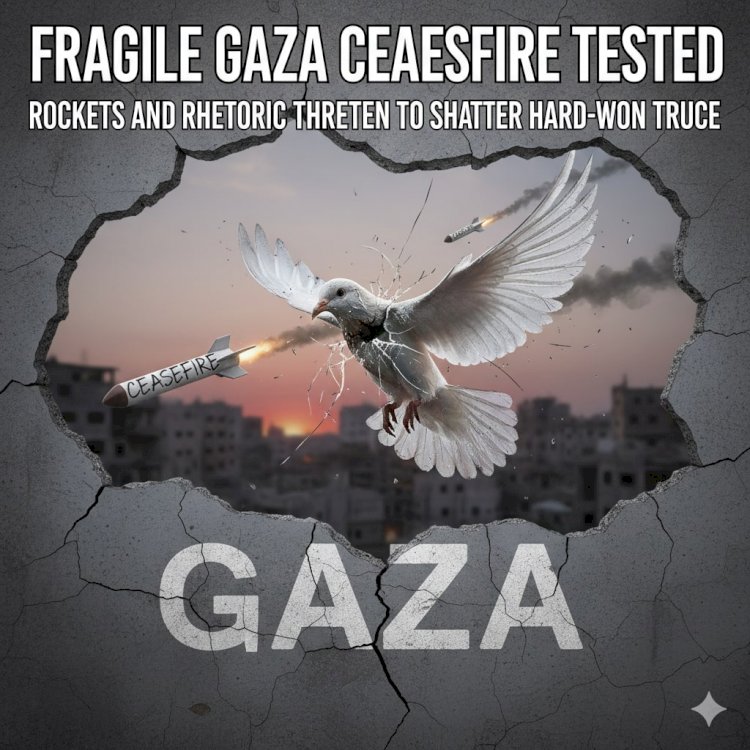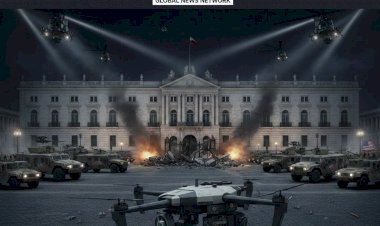Fragile Gaza Ceasefire Tested: Rockets and Rhetoric Threaten to Shatter Hard-Won Truce

A Dawn of Hope, Quickly Dimmed
Gaza City, October 29, 2025 – In the shadowed corridors of a war-weary Middle East, a fragile ceasefire between Israel and Hamas teeters on the brink, its threads fraying under the weight of fresh rocket fire and blistering accusations. What began as a glimmer of hope just two weeks ago—brokered in marathon talks amid the rubble of Gaza's shattered skyline—now risks unraveling into renewed chaos, leaving millions in limbo and the international community scrambling to salvage peace.
The Truce That Was Meant to Heal
The truce, inked on October 15 after 18 grueling months of conflict that claimed over 40,000 lives, was hailed as a breakthrough. It promised a phased exchange of hostages for Palestinian prisoners, unhindered humanitarian aid corridors, and a mutual stand-down along the volatile border. Aid trucks rumbled into Gaza for the first time in months, carrying flour, medicine, and the faint whispers of normalcy. Families reunited in tear-streaked embraces, and children kicked soccer balls through streets still scarred by craters. For a fleeting moment, the air felt lighter, the sirens silent.
Rockets Shatter the Silence
But that illusion shattered at dawn yesterday. Sirens wailed across southern Israel as a barrage of at least 12 rockets streaked from Gaza, slamming into open fields near the kibbutzim that have long borne the brunt of the violence. No casualties were reported, but the psychological toll was immediate: families herded into bomb shelters, memories of October 7, 2023, flooding back like a tidal wave. Israeli officials were quick to point fingers, vowing a "decisive response" if the attacks were traced to Hamas holdouts. "This is a blatant provocation," thundered a military spokesperson, their voice crackling over emergency broadcasts. "We will not allow terrorists to dictate the terms of our security."
Gaza’s Counter-Narrative
From Gaza's besieged enclaves, the narrative flipped like a coin in the wind. Hamas spokespeople decried the strikes as "defensive measures" against alleged Israeli incursions into no-man's-land buffer zones—incursions that Jerusalem dismissed as routine patrols to secure the ceasefire line. Eyewitnesses in Rafah described the rockets as sporadic pops against the night sky, launched from makeshift sites amid the ruins of what was once a bustling refugee camp. "We're not the aggressors," one anonymous fighter told reporters huddled in a makeshift press center. "Every day, drones buzz overhead, and settlers encroach. This truce was supposed to end the siege, not entrench it."
Escalation Beyond the Battlefield
The tit-for-tat has escalated tensions beyond the battlefield. In Tel Aviv's bustling cafes, patrons scroll news feeds with furrowed brows, debating whether to pack emergency kits or trust the fragile accord. In Gaza's overcrowded hospitals, doctors ration bandages and brace for the worst, their pleas for sustained aid drowned out by the drumbeat of diplomacy. International envoys, jet-lagged from shuttling between Cairo, Doha, and Washington, issued stern warnings overnight: "Any breach risks catastrophic escalation," read a joint statement from the UN, EU, and Arab League. Yet, behind closed doors, whispers of stalled talks over water rights and reconstruction funds paint a picture of deeper fissures.
A Paradox of Peace
At the heart of this standoff lies a paradox: both sides crave the ceasefire's promise, yet neither can afford to appear weak. For Israelis, the rockets evoke a visceral fear, a reminder that peace is as elusive as desert rain. For Palestinians, the truce feels like a half-measure, a pause that rebuilds little while the blockade chokes their dreams. Aid organizations report stockpiles piling up at border crossings, delayed by mutual suspicions. "We've got tents, food, hope in boxes," lamented a relief worker in Khan Younis, "but getting them to people? That's the real battle."
Night Falls on a Tinderbox
As night falls over the Gaza Strip, the silhouette of minarets punctuates a sky streaked with searchlights. In Jerusalem's Knesset, lawmakers convene in emergency session, weighing airstrikes against restraint. Hamas commanders huddle in tunnels, their radios tuned to the same frequencies of doubt. The world watches, breath held, knowing that in this tinderbox, a single spark could ignite inferno.
For now, the ceasefire clings to life—a threadbare veil over old wounds. But with each accusation hurled and rocket loosed, the fabric thins. Will cooler heads prevail, or will Gaza's fragile peace join the graveyard of broken promises? The dawn will tell, but history whispers a grim caution: in the Holy Land, truces are forged in fire, and tested in the ashes.

 content-team
content-team 


















